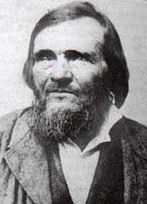| Part of a series on |
| Baptists |
|---|
 |
| |
The Covenanted Baptist Church of Canada is a small body of Predestinarian Baptists in Canada with Scottish roots. [1]
| Part of a series on |
| Baptists |
|---|
 |
| |
The Covenanted Baptist Church of Canada is a small body of Predestinarian Baptists in Canada with Scottish roots. [1]
In 1818 Dugald Campbell, of North Knapdale, Scotland emigrated to Canada and settled in Aldborough, Elgin County, Ontario. [2] Campbell was a deacon in Scotland, but upon his arrival soon began preaching.
In 1820, Elder Dugald Campbell and his followers, believing the Regular Baptists of the area had departed from gospel faith and order, withdrew from them and constituted a church in Aldborough, now known as the Particular Covenanted Baptist Church in Canada. Still a small group, they had grown to five churches in the 1850s - Aldborough, Dunwich, Ekfird, Lobo, and Orford. [3] The Covenanted Baptist Church did not fellowship with any other churches in North America, until an elder, Thomas McColl, received some issues of the Signs of the Times, a Primitive Baptist periodical published by Gilbert Beebe of New York City. In 1857 and 1858, McColl invited Primitive Baptists to visit and preach among their churches. The two groups saw they were established on the same faith and order, and began a relationship of fellowship one with another, which continued to the 20th century. The Covenanted Baptists held the doctrine of absolute predestination, and, after Primitive Baptists in the United States suffered division, remained in correspondence with the Absolute Predestinarian Primitive Baptists.

Reformed Christianity, also called Calvinism, is a major branch of Protestantism that began during the sixteenth-century Protestant Reformation, a schism in the Western Church. In the modern day, it is largely represented by the Continental Reformed, Presbyterian, and Congregational traditions, as well as parts of the Anglican and Baptist traditions.

The Second Great Awakening was a Protestant religious revival during the late 18th to early 19th century in the United States. It spread religion through revivals and emotional preaching and sparked a number of reform movements. Revivals were a key part of the movement and attracted hundreds of converts to new Protestant denominations. The Methodist Church used circuit riders to reach people in frontier locations.

The Restoration Movement is a Christian movement that began on the United States frontier during the Second Great Awakening (1790–1840) of the early 19th century. The pioneers of this movement were seeking to reform the church from within and sought "the unification of all Christians in a single body patterned after the church of the New Testament."

Reformed Baptists, Particular Baptists and Calvinistic Baptists, are Baptists that hold to a Calvinist soteriology. Depending on the denomination, Calvinistic Baptists adhere to varying degrees of Reformed theology, ranging from simply embracing the Five Points of Calvinism, to accepting a modified form of federalism; all Calvinistic Baptists reject the classical Reformed teaching on infant baptism. While the Reformed Baptist confessions affirm views of the nature of baptism similar to those of the classical Reformed, they reject infants as the proper subjects of baptism. The first Calvinistic Baptist church was formed in the 1630s. The 1689 Baptist Confession of Faith is a significant summary of the beliefs of Reformed Baptists. The name "Reformed Baptist" dates from the latter part of the 20th century to denote Baptists who retained Baptist ecclesiology, and reaffirmed Reformed biblical theology, such as Covenant theology.
Two-Seed-in-the-Spirit Predestinarian Baptists are part of a larger sub-group of Baptists that is commonly referred to as "anti-mission" Baptists. This sub-group includes the Duck River and Kindred Baptists, Old Regular Baptists, some Regular Baptists and some United Baptists. Only a minuscule minority of Primitive Baptists adhere to the Two-Seed doctrine. The primary centers of Two-Seedism were in Northern Alabama, Arkansas, Eastern Tennessee, Florida, Georgia, Illinois, Indiana, and Texas. As of 2002, five churches or congregations of this faith and order still existed in Alabama, Indiana, Tennessee, and Texas.
The National Primitive Baptist Convention, USA is a group of Black Primitive Baptists that has adopted progressive methods and policies not in keeping with the historical and theological background of Primitive Baptists in general. The Convention was organized in Huntsville, Alabama in 1907. These churches have adopted the use of instrumental music, Sunday Schools, revivals and church auxiliaries. The idea of a national convention is itself foreign to standard Primitive Baptist concepts. They still adhere the Calvinistic or Predestinarian teachings held by other Primitive Baptists, but in a more progressive manner and are similar to the black National Baptist Conventions. The NPBC churches continue with Primitive Baptist usage in retaining the observance of feet washing as an ordinance of the church, and in calling their ministers "elder." These churches are not in fellowship with the remaining "old school" white Primitive Baptists. Most of the National Primitive Baptist Convention churches are located in the southern United States.
Primitive Baptists – also known as Regular Baptists, Old School Baptists, Foot Washing Baptists, or, derisively, Hard Shell Baptists – are conservative Baptists adhering to a degree of Calvinist beliefs who coalesced out of the controversy among Baptists in the early 19th century over the appropriateness of mission boards, tract societies, and temperance societies. Primitive Baptists are a subset of the Calvinistic Baptist tradition. The adjective "primitive" in the name is used in the sense of "original".
The Old Regular Baptist denomination is one of the oldest in Appalachia with roots in both the Regular and Separate Baptists of the American Colonies and the Particular Baptist of Great Britain. This group has seen a marked decline in its membership during the last two decades. Part of the decline may be attributable to orthodox biblical interpretations like a dress code where men must wear long pants, not shorts, and women must wear long dresses. Other such interpretations include women not being allowed to cut their hair or speak publicly on church business, although women can frequently shout while praising. Members who do not comply with the strict dress code and norms face being "churched", i.e., being kicked out of the congregation and possibly shunned. The Old Regular Baptist Faith and order with her many branches and factions still remains the dominant Faith in some rural Central Appalachian Counties along or near the Kentucky Virginia border. In most churches, the congregation maintains a collection of photographs of deceased members.
Regular Baptists are "a moderately Calvinistic Baptist denomination that is found chiefly in the southern U.S., represents the original English Baptists before the division into Particular and General Baptists, and observes closed communion and foot washing", according to Merriam Webster. This definition describes Old Regular Baptists, not those who formed as a result of the Fundamentalist-Modernist controversy.

The Baptist General Convention of Texas (BGCT), more commonly known as the Texas Baptists, is a Baptist Christian denomination in the U.S. state of Texas. It is affiliated with the Southern Baptist Convention and the Baptist World Alliance. Texas Baptist offices are located in the city of Dallas, though convention staff are located across the state. According to a denomination census released in 2023, it claimed 2,038,537 members and 5,375 churches
The Apostolic Christian Church (ACC) is a worldwide Christian denomination from the Anabaptist tradition that practices credobaptism, closed communion, greeting other believers with a holy kiss, a capella worship in some branches, and the headcovering of women during services. The Apostolic Christian Church only ordains men, who are authorized to administer baptism, the Lord's Supper, and the laying on of hands.
The Church of Christ, Instrumental, also known as Kelleyites, are a baptistic body of Christians based in central Arkansas.

The Canadian and American Reformed Churches (CanRC) is a federation of Protestant Reformed (Calvinist) churches in Canada and the United States, with historical roots in the Reformed Churches of the Netherlands.

The Evangelical Christian Church(Christian Disciples) as an evangelical Protestant Canadian church body. The Evangelical Christian Church's national office in Canada is in Waterloo, Ontario.

Daniel Parker was an American minister in the Primitive Baptist Church in the Southern United States and the founder of numerous churches including Pilgrim Primitive Baptist Church at Elkhart, Texas, the location of the Parker family cemetery. As an elder, Parker led a group who separated from that church and formed the Two-Seed-in-the-Spirit Predestinarian Baptists. Parker is one of the earliest documented proponents of the doctrine of Serpent Seed among Protestant Christianity.

In Christianity, the ordination of women has been taking place in an increasing number of Protestant and Old Catholic churches, starting in the 20th century. Since ancient times, certain churches of the Orthodox tradition, such as the Coptic Orthodox Church, have raised women to the office of deaconess. While ordination of women has been approved in many denominations, it is still a very controversial and divisive topic.
The Disciples of Christ (Campbell Movement) were a group arising during the Second Great Awakening of the early 19th century. The most prominent leaders were Thomas and Alexander Campbell. The group was committed to restoring primitive Christianity. It merged with the Christians (Stone Movement) in 1832 to form what is now described as the American Restoration Movement (also known as the Stone–Campbell Restoration Movement).
The Canadian National Baptist Convention is an association of Baptist Christian churches in Canada. It is affiliated with the Baptist World Alliance and the Evangelical Fellowship of Canada. The headquarters is in Cochrane, Alberta.